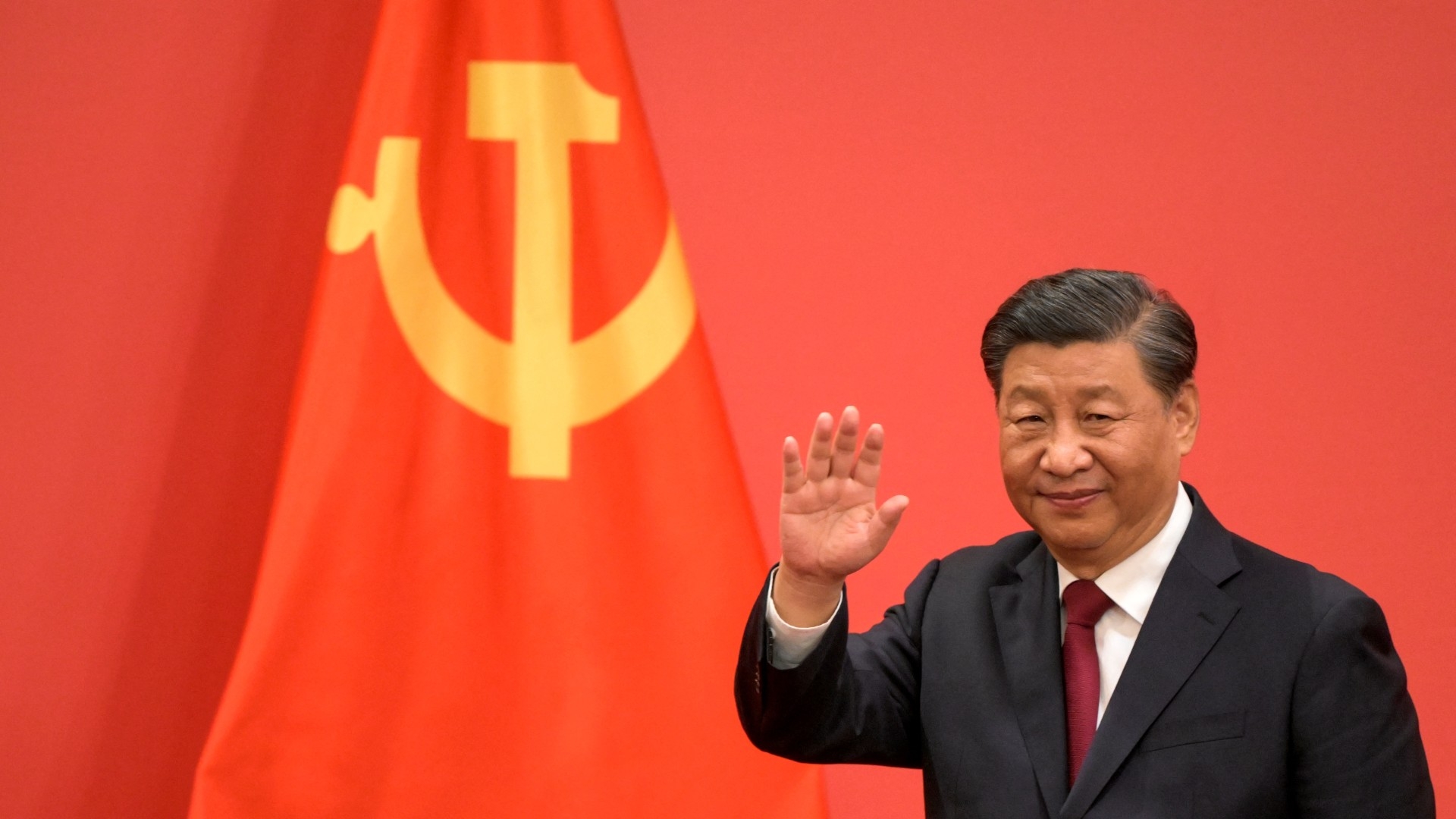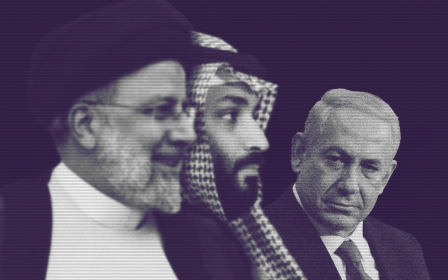Saudi-Iran reconciliation: How China is reshaping the Middle East

As President Xi Jinping begins his third term in office this week, it seems that China has abandoned its once low-profile foreign policy and now seeks to assert itself as an imperial state that safeguards its global interests.
The projection of this image is at the centre of the country's ambitious new Silk Road initiative, also known as the Belt and Road Initiative (BRI).
Iran, a critical land-based Silk Road destination, is of great importance, while Saudi Arabia and the Gulf region are key links in the Maritime Silk Road.
China now seeks to assert itself as an imperial state that safeguards its global interests
Xi's pivotal visit to Riyadh at the end of last year was crucial in paving the way for a breakthrough in the long-standing impasse between Saudi Arabia and Iran.
Initially, both Iran and the United States were concerned and held contrasting views about China's growing ties with Saudi Arabia. However, Xi's visit was a game changer that led to China brokering a deal to restore diplomatic relations between the two key Middle Eastern countries after seven years of estrangement and escalation.
Stay informed with MEE's newsletters
Sign up to get the latest alerts, insights and analysis, starting with Turkey Unpacked
China's strategic interest in the Middle East lies in securing energy sources and markets. It is the top buyer of Saudi crude oil, importing 81 million metric tonnes in 2021, worth $43.93bn.
Weakened US role
China is not seeking to undermine America's role in the Middle East. Instead, China is benefiting from the relative decline of US influence there, specifically from the shifts that have occurred with the last three US presidents.
Obama prioritised a nuclear deal with Iran at the expense of Saudi and Gulf interests. During Obama's presidency, Iran's allies dominated Iraq, Syria and Lebanon, and the Houthis in Yemen were advancing towards Bab al-Mandab.
Donald Trump cancelled the deal with Iran and initiated a weak peace project with Israel that undermined the idea of land for peace, putting Saudi Arabia, whose Arab Peace Initiative was based on this very concept, in an embarrassing situation.
US President Joe Biden, who promised to re-engage with Iran and treat Saudi Arabia like a pariah during his election campaign, found himself in Riyadh asking the Saudi Crown Prince Mohammed bin Salman to increase oil production, amidst the fallout from the Russia-Ukraine war, and receiving a cold reception from the kingdom.
After these three experiments, China opened up to Iran, Saudi Arabia, and Israel, at the expense of America's role in the region.
The US has repeatedly expressed concern over China's growing influence in the region, particularly its ties to Iran, which has had a tense relationship with the US since the 1979 Islamic Revolution, and Saudi Arabia, which has been a longtime ally of the US but has experienced tensions during the Obama and Biden presidencies.
Similarly, Washington has exerted persistent pressure to limit the development of Sino-Israeli economic cooperation.
Although China has faced disputes with its close neighbours, such as India, Japan and Vietnam, and has sought to establish a network of influence in Central Asia, which has been dubbed "Sinostan" in a book by Raffaello Pantucci and Alexandros Petersen, it must also coexist with Russian hegemony in that region. However, the Middle East presents a vast opportunity for China due to its abundant resources and strategic location.
As China works to broker reconciliation between Iran and Saudi Arabia, it is worth considering whether this could be a historic moment similar to the 1945 USS Quincy Cruiser meeting between Saudi Arabia's founder, King Abdulaziz Bin Saud, and President Franklin D Roosevelt, which forged a long-lasting alliance between the US and Saudi Arabia.
Today, China's efforts to restore Iranian-Saudi relations raise the question of whether Xi Jinping's moment with Bin Salman could be a prelude to a "fourth" iteration of the Saudi state - to follow his grandfather's "third" one - based on diversifying the kingdom's economic relations and political intersections on a global scale, in the aftermath of a long-standing relationship with the US as its primary global partner.
Opportunities and obstacles
The recent Chinese efforts to reconcile Saudi Arabia and Iran also raise questions about the extent of this reconciliation. Will it only aim to restore the pre-2016 status quo, or will it lead to a resolution of the proxy conflicts that have plagued the region as a result of that rivalry?
The Chinese initiative forces Americans and Westerners to acknowledge China's growing influence in the Middle East, regardless of whether they have a strategy for the region.
While playing a significant role in bringing about a rapprochement between two Middle Eastern rivals, nonetheless, the complicated and long-standing issues between the two regimes cannot be resolved easily. Therefore, it is crucial to recognise several obstacles and challenges that must be addressed and overcome during this process.
While stopping Houthi attacks on its territories is a top priority for Saudi Arabia, it is important to note that this alone is not sufficient to resolve the broader political situation in Yemen. Saudi Arabia is not willing to accept Houthi domination over most of Yemen as a quid pro quo for halting their attacks on Saudi territory.
On the other hand, restoring Saudi-Iranian relations would allow for a reshuffling of the cards in Iraq for greater calm. As the calm extends in Iraq, it could enable Baghdad to regain its regional power, without being limited to Iranian dominance or Saudi influence.
The situation in Syria, however, is more problematic. If Arab countries use their openness towards Bashar al-Assad as a way to distance him from Iran, what happens once they become open towards Iran? Will Iran cooperate in shaping Syria's future after Assad?
In Lebanon, the issue is yet more complex. Hezbollah is a key player in Iran's regional interests, so will there be an agreement to practice "geo-political taqiyya" (dissimulation)? On the other hand, where does Israel stand? Will China's position lead Israel to take a harder stance on Iran and its nuclear programme, or will China set a new precedent in its relationship with Israel?
The prize
Given this crowd of questions, there remains a fundamental fact, which is that American influence in the region, despite its relative decline, remains dominant there.
The question that arises here is whether the Chinese initiative opens the door for China to have its own military base in the Gulf region
Its strength is reflected in the continued presence of US military bases in the Gulf and the American military foothold in Iraq, Syria, and Jordan.
China, on the other hand, scored an advance point on this level in 2017 when it opened a military base in Djibouti, close to Yemen.
The Chinese base in Djibouti coexists with seven other foreign military bases in the same small country, which is a member state of the Arab League. Russia, which has several bases in Syria, is working to have a base for its fleet in Sudan. While this is not the only lens to view these countries' influence, geopolitics cannot be read without seeing the map of foreign military bases in the region.
The question that arises here is whether the Chinese initiative to bring Iran and Saudi Arabia together opens the door for China to have its own military base in the Gulf region, after a long history of British and then American military presence in this area. We are not there yet, but the matter will inevitably be raised sooner or later.
The views expressed in this article belong to the author and do not necessarily reflect the editorial policy of Middle East Eye.
This article is available in French on Middle East Eye French edition.
Middle East Eye delivers independent and unrivalled coverage and analysis of the Middle East, North Africa and beyond. To learn more about republishing this content and the associated fees, please fill out this form. More about MEE can be found here.







